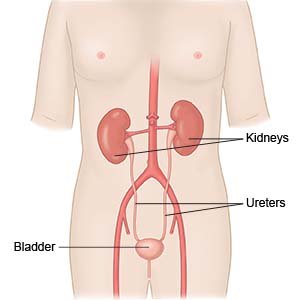Cystectomy with Ileal Conduit
Medically reviewed by Drugs.com. Last updated on Aug 4, 2025.
WHAT YOU NEED TO KNOW:
Cystectomy with ileal conduit is surgery to remove your bladder. Your surgeon will create a urostomy to help urine drain from your kidneys out of your body. A passage called an ileal conduit will be used to connect your kidneys to an opening in your abdomen. The opening, called a stoma, will be connected to a bag that collects urine.
 |
HOW TO PREPARE:
The week before your surgery:
- Your surgeon will tell you how to prepare. Arrange to have someone drive you home after surgery.
- Tell your surgeon about all medicines you currently take. He or she will tell you if you need to stop any medicine for surgery, and when to stop. He or she will tell you which medicines to take or not take on the day of surgery.
- You may be given medicines to prevent blood clots or an infection caused by bacteria.
- Tell your surgeon about all your allergies, including medicines, anesthesia, or antibiotics.
- You may meet with a urostomy specialist to decide the best spot for the opening on your abdomen. You will also learn how to care for your stoma and empty the urine bag.
- You may need blood or urine tests. You may also need an ECG, or x-rays or a CT scan of your kidneys, bladder, or ureters.
The night before your surgery:
You may be told not to eat or drink anything after midnight.
The day of your surgery:
- Take only the medicines your surgeon told you to take.
- You or a close family member will be asked to sign a legal document called a consent form. It gives healthcare providers permission to do the procedure or surgery. It also explains the problems that may happen, and your choices. Make sure all your questions are answered before you sign this form.
- An IV will be placed in a vein. You may be given medicine or liquids through the IV.
WHAT WILL HAPPEN:
What will happen:
- General anesthesia will be given to keep you asleep and free from pain during surgery. Your surgeon will make an incision, usually near your belly button. He or she will disconnect the ureters from your bladder. Your bladder will be removed. Nearby tissue or organs may also be removed. In men, the organs include the prostate and seminal vesicles (glands near the prostate). In women, the organs include the uterus, cervix, ovaries, and fallopian tubes.
- Your surgeon will then remove part of your intestine. He or she will use this to connect your ureters to an opening in your abdomen (the stoma). Two small stents (tubes) will be placed inside the ureters to help urine drain while you heal. Your surgeon will close your incision with stitches or staples.
After your surgery:
You will be taken to a room to rest until you are fully awake. Healthcare providers will monitor you closely for any problems. Do not get out of bed until your healthcare provider says it is okay. When your healthcare provider sees that you are okay, you will be able to go home or taken to your hospital room.
CONTACT YOUR HEALTHCARE PROVIDER IF:
- You have trouble urinating.
- You have a fever.
- You have questions or concerns about your surgery.
Seek Care Immediately if
- You cannot urinate at all.
Risks
Surgery may increase your risk for bleeding or infection. The stoma may become swollen or painful. Part of your intestine may bulge into the area around the stoma. Urine may leak where the ureters are connected to the section of intestine. Your ureters may also become blocked and not empty urine. Your intestines may stop working, and it may become difficult to have a bowel movement. You may get a life-threatening blood clot.
Related medications
Care Agreement
You have the right to help plan your care. Learn about your health condition and how it may be treated. Discuss treatment options with your healthcare providers to decide what care you want to receive. You always have the right to refuse treatment.© Copyright Merative 2025 Information is for End User's use only and may not be sold, redistributed or otherwise used for commercial purposes.
The above information is an educational aid only. It is not intended as medical advice for individual conditions or treatments. Talk to your doctor, nurse or pharmacist before following any medical regimen to see if it is safe and effective for you.
Learn more about Cystectomy with Ileal Conduit
Care guides
Further information
Always consult your healthcare provider to ensure the information displayed on this page applies to your personal circumstances.
